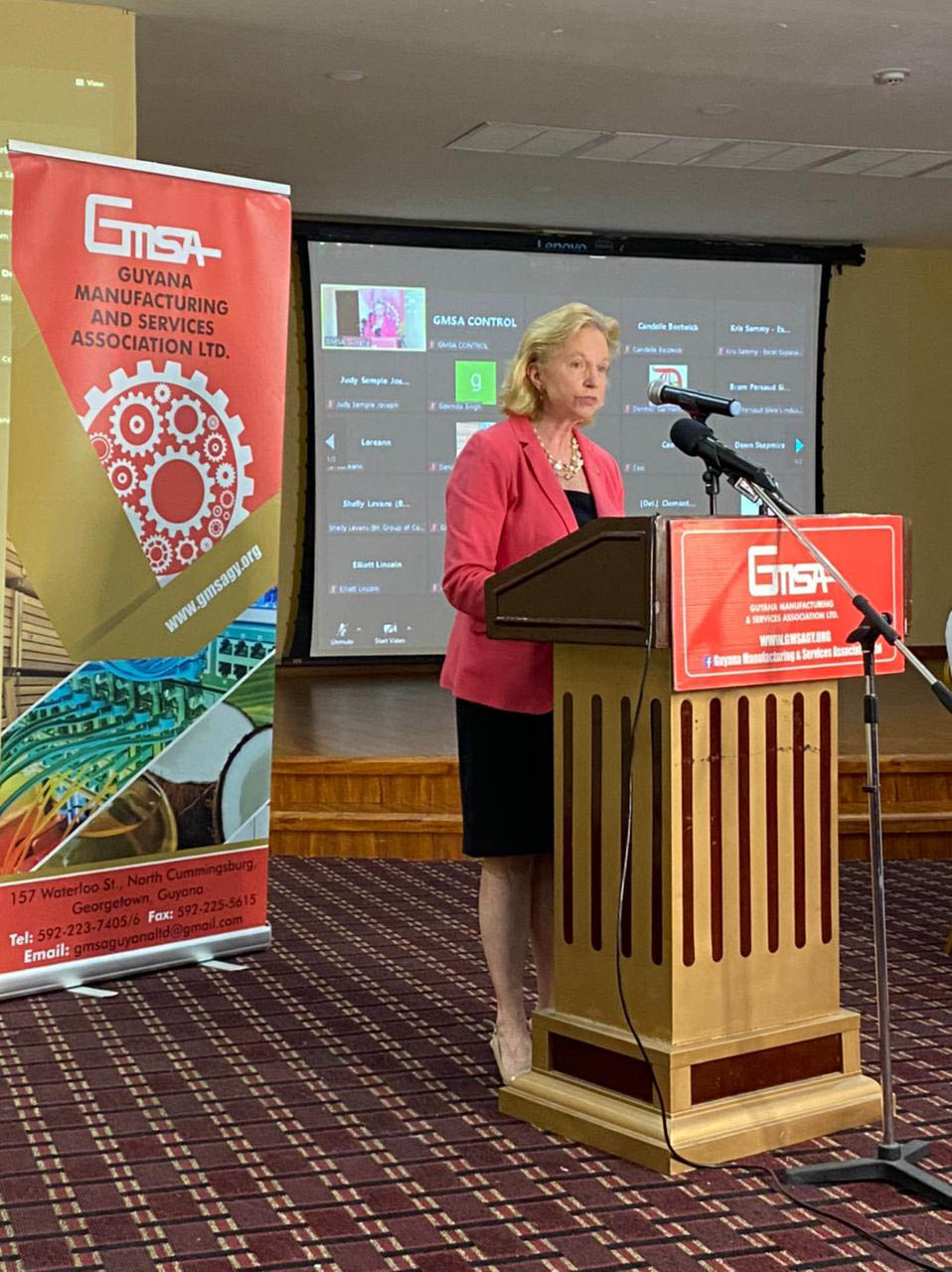Citing the burgeoning oil and gas industry, US Ambassador to Guyana, Sarah-Ann Lynch says that economic diversification is “absolutely critical” to achieving prosperity for all here and staving off the Dutch Disease.
Delivering an address to the Guyana Manufacturing and Services Association’s Annual General Meeting at the Ramada Princess Hotel yesterday Lynch also stressed the need for modernization of the tendering process.
“Economic diversification is absolutely critical to achieving prosperity for all. Just as Guyana’s high tide enables bigger ships to come to port, economic diversification can be a high tide that lifts all sectors and all people of Guyana. In addition, diversification will serve as a guard rail for Guyana against the Dutch Disease”, she said.
The ambassador pointed out that economic growth does not always result in economic diversification.
“In order to enable economic diversification, we also know that lower-cost, more reliable electricity must be available for manufacturers. Land leases or permits must be available to agricultural investors, and reliable and high-quality infrastructure must be built including roads, bridges, and ports”, she told the gathering.
In addition, she said that the tender process for selecting firms to support in these areas should “really be modernized” so Guyana receives the high-quality products it deserves which will enable its diversification.
Pointing out that one of Guyana’s greatest strengths is its natural environment and the potential for tourism, Lynch noted that the country continues to have high electricity and other costs that make it an expensive place for tourists.
“For both expatriates and Guyanese, it is often cheaper and easier to vacation in Barbados or Miami than it is in the South Rupununi. With regard to foodstuffs, there are often more products on the shelves here in Guyana from other Caribbean countries, rather than from Guyana. We are convinced that reliable, lower-cost electricity is absolutely crucial to changing these realities, as is reliable infrastructure that is built to last”, she stated.
Because of these binding constraints, she said that the embassy is encouraging local businesses to consider linking up with US firms who want to partner in the long-term development of Guyana.
“Yes, sometimes their high standards, rules and regulations will require additional work or certification on your part, but we believe that work will pay off for your businesses in the long run”, Lynch asserted.
The ambassador said that quality US companies continue to be interested in partnering with businesses here. Last year in the first three quarters alone, she said that the trade between two countries was 1.6 billion USD.
“And we’re just getting started. U.S. companies are ready to partner in a number of areas, not just in the oil and gas sector, but also infrastructure, agriculture, health care, services, tourism, etc”, she said.
She added: “Let’s be honest. The floodgates have opened. Guyana is truly `open for business.’ The companies are coming, and they’re coming often”.
She said that more than 3,000 Guyanese benefit directly from good jobs in the oil and gas sector and the number is higher when indirect employment numbers are factored in.
“What we know for sure is that Guyanese youth can now look to great jobs here in Guyana instead of overseas”, she posited.
Reflecting on what was needed to build Guyana’s sustainability and ensure that the Dutch Disease does not take hold, Lynch said she believes that it can be achieved by increasing the standards at which everyone operates and leave any bad habits in the past.
This will require work by all, including the private and public sectors, she said, adding that health and safety standards must be upheld, training must be of the highest quality so standards are met and kept, and processes must be transparent and equitable “so everyone has a fair chance to compete and grow”.
She applauded the American Chamber of Commerce for hosting a Health, Safety, Security and Environment summit last week that highlighted the significance of safety and how Guyanese and US firms here can better maintain high standards.
“Industrial accidents can have a major impact on a company’s bottom line. The costs of workplace injuries and illnesses include direct costs like workers’ compensation payments, medical expenses, and costs for legal services, along with indirect costs like training replacement employees, accident investigation and implementation of corrective measures, lost productivity, repairs of damaged equipment and property, and costs associated with lower employee morale and absenteeism”, she stated
Lynch said that U.S. companies know the cost of injury very well and which is why safety is such an important part of everyday procedures.





